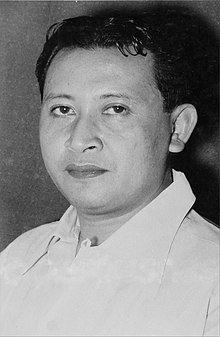Mr. Kanjeng Pangeran Haryo Sadjarwo Djarwonagoro | |||||||||||||||||||||||||||||||||||||||||||||||||
|---|---|---|---|---|---|---|---|---|---|---|---|---|---|---|---|---|---|---|---|---|---|---|---|---|---|---|---|---|---|---|---|---|---|---|---|---|---|---|---|---|---|---|---|---|---|---|---|---|---|
 Official portrait, c. 1954 | |||||||||||||||||||||||||||||||||||||||||||||||||
| Personal details | |||||||||||||||||||||||||||||||||||||||||||||||||
| Born | 3 August 1917[a] Surakarta, Surakarta Sunanate | ||||||||||||||||||||||||||||||||||||||||||||||||
| Died | 6 May 1996 (aged 78) Jakarta, Indonesia | ||||||||||||||||||||||||||||||||||||||||||||||||
| Spouse | Endang Soemarti Sadjarwo | ||||||||||||||||||||||||||||||||||||||||||||||||
| Parent |
| ||||||||||||||||||||||||||||||||||||||||||||||||
| |||||||||||||||||||||||||||||||||||||||||||||||||
| |||||||||||||||||||||||||||||||||||||||||||||||||
Sadjarwo Djarwonagoro (3 August 1917 – 6 May 1996) was a Javanese politician who served as the Minister of Agriculture, Minister of Agrarian Affairs, and member of the People's Representative Council and People's Consultative Assembly. He was also the rector of the Untag (17 August University) in Jakarta.
Sadjarwo was educated in a Dutch school for indigenous people and continued his studies until high school. He participated in a nationalist organization during this time. After graduating from high school, he worked as an employee in the Ministry of Labor, founded the Peasants Front of Indonesia, and participated in political activities in Madiun. His career began to rise as he was appointed to the Working Body of the Central Indonesian National Committee.
After the recognition of Indonesia, Sadjarwo was appointed as the Minister of Agriculture of Indonesia, representing the Peasants Front of Indonesia. During his time in the ministry, he enacted several policies, including the merger of several academies owned by the Ministry of Agriculture to form the Academy of the Ministry of Agriculture, and the nationalization of Dutch plantations and farms.
He was re-appointed as the Ministry of Agrarian Affairs in 1959. He was involved in the creation of the Basic Agrarian Law, which had been proposed since 1948. He proposed the bill to the People's Representative Council, and it was enacted shortly thereafter. After the enactment of the law, he began to implement land reform in Indonesia, but failed due to the prolonged conflicts between various political groups. He was appointed as a member of the People's Consultative Assembly and the People's Representative Council after his appointment as minister was not renewed for the next term. After he resigned from his former position, he became the rector of the Untag (17 August University), a private university in Indonesia.
In 1989, seven years before his death, he was accused of being a communist by Soegiarso Soerojo, a book author, and Ruben Nalenan, a lecturer from Untag. He proved his innocence of these accusations.[citation needed]
Cite error: There are <ref group=lower-alpha> tags or {{efn}} templates on this page, but the references will not show without a {{reflist|group=lower-alpha}} template or {{notelist}} template (see the help page).